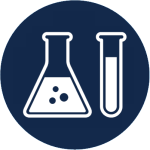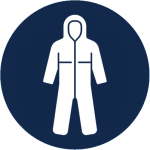Laboratory Safety
Laboratory Safety inspects University laboratories to anticipate, recognize and control personnel exposures to workplace hazards. This section provides consulting services for laboratory safety concerns and manages the University Chemical Hygiene Plan.
In addition, Laboratory Safety ensures compliance with the University’s Laboratory Ventilation Policy and manages laboratory closeouts. If you suspect that a chemical fume hood in your laboratory is not operating properly, or if you are leaving the University or relocating your lab, please contact us.
Related Topics
 Laboratory Emergencies
Laboratory Emergencies Laboratory Equipment
Laboratory Equipment Laboratory Safety Plan
Laboratory Safety Plan Laboratory Personnel
Laboratory Personnel Laboratory Upkeep
Laboratory Upkeep Personal Protective Equipment
Personal Protective Equipment Safety Labels and Signage
Safety Labels and Signage Transporting Research Materials
Transporting Research Materials
Safety Manuals
Training
EHS Applications
- Lab Safety Plan
- Chemical Inventory
- Worker Registration Form
- EHS Compliance Portal Login
- Hazardous Material/Waste Pick-up Request
- Lab Entrance Signage
- UEOHC Appointment System
Forms
Resources
General Resources
- OSHA Laboratory Safety Guidance
- Guidelines for Chemical Laboratory Safety in Academic Institutions
- DCHAS Laboratory Risk Assessment (Video)
- Working in the Lab Alone (Video)
- ACS: Identifying and Evaluating Hazards in Research Laboratories
- Prudent Practices in the Laboratory: Handling and Management of Chemical Hazards, The National Academies Press 2011 Edition (free access online)
Safety Culture Resources
- Safe Science: Promoting a Culture of Safety in Academic Chemical Research (2014)
- APLU: A Guide to Implementing a Safety Culture in Our Universities
- Creating Safety Cultures in Academic Institutions
- Chemical safety education for the 21st century — Fostering safety information competency in chemists

 Laboratory Safety
Laboratory Safety